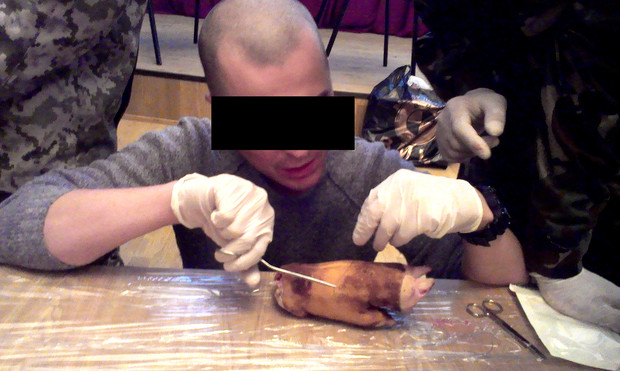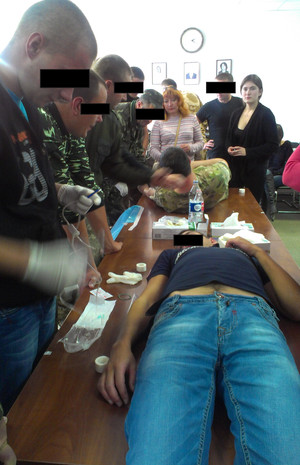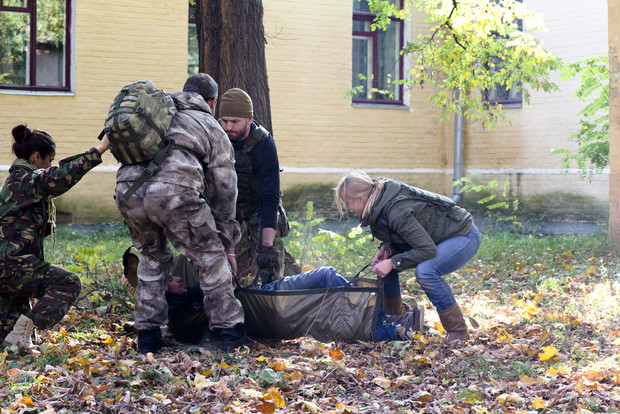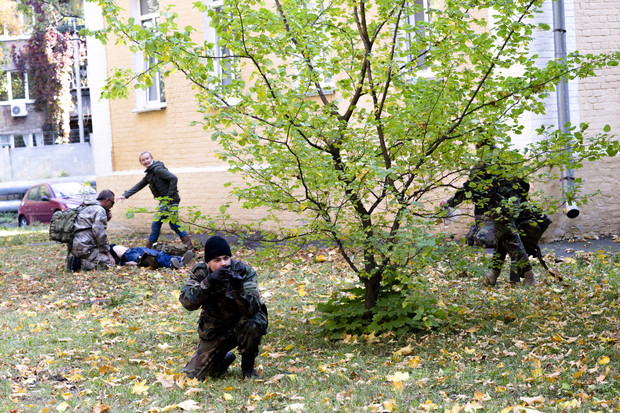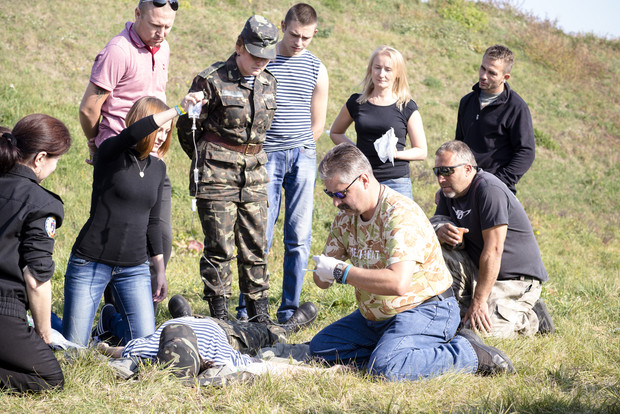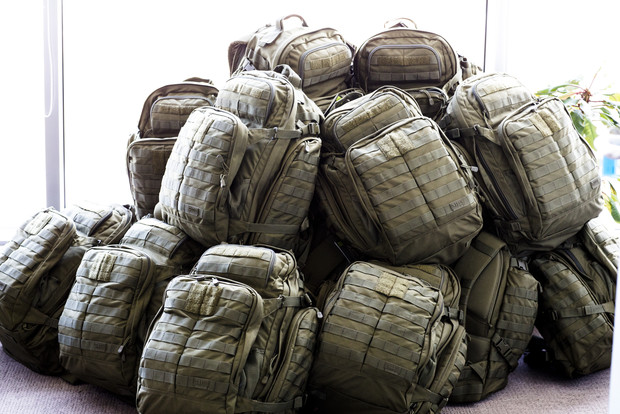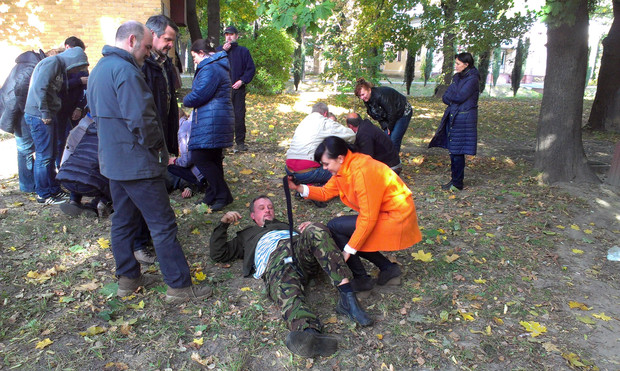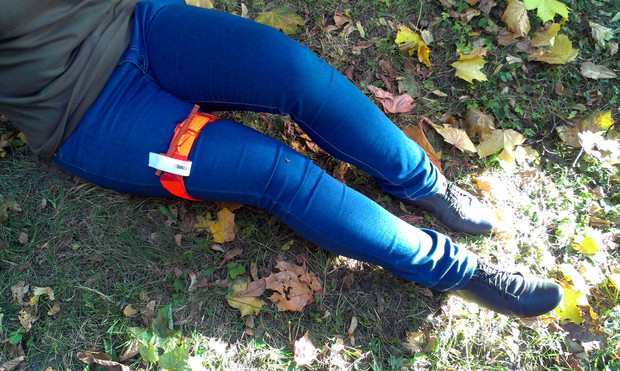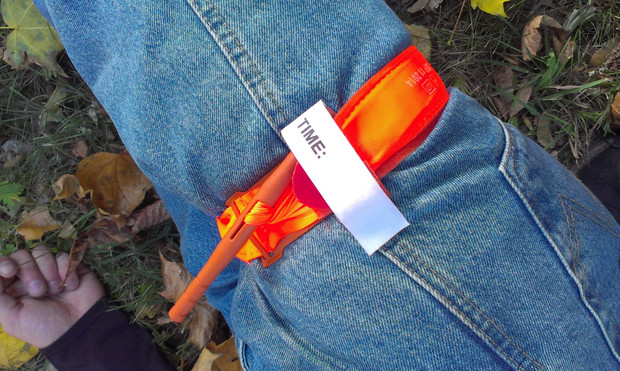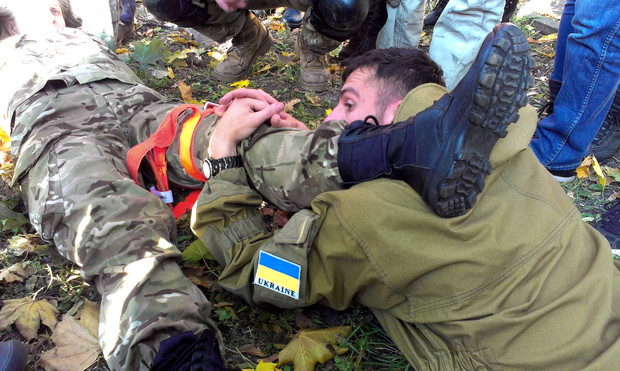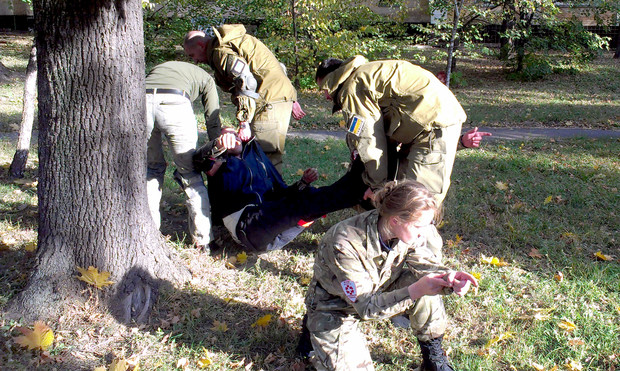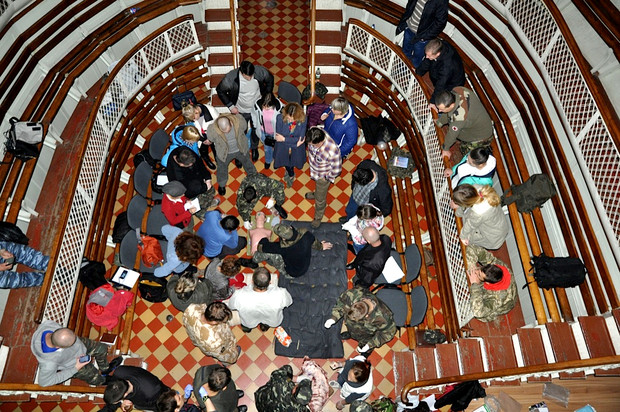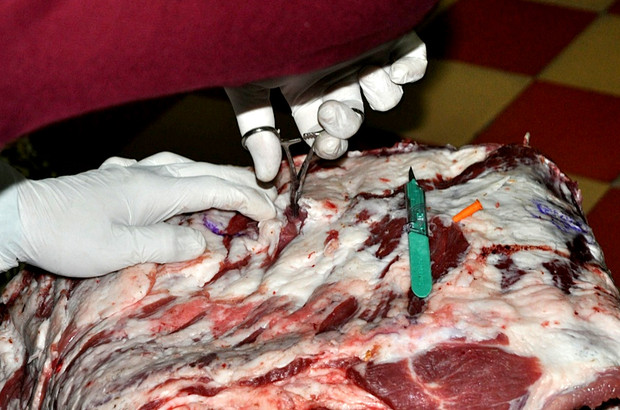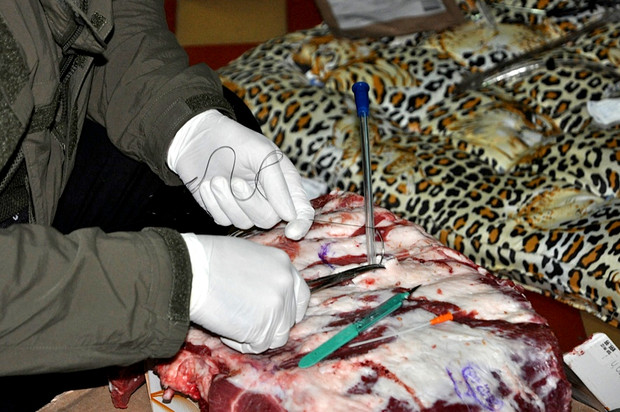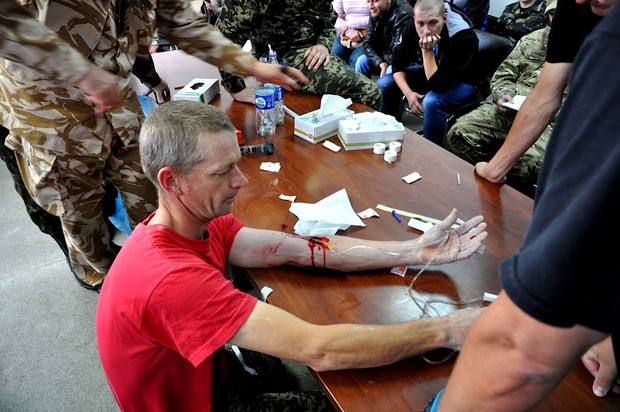First video tutorial about CAT tourniquet application was uploaded to the Medsanbat website. One of the project’s trainers tells about the main principles of evacuation of a victim with bleeding, tourniquet application and demonstrates tourniquet application.
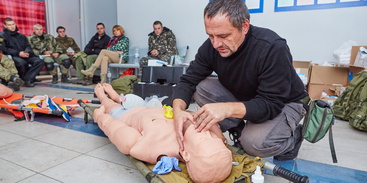
OCTOBER 2014. FIRST STAGE
In the three weeks of Medsanbat training hundreds of combat medics took the course in Kyiv, Mariupol, Sloviansk, Dnipropetrovsk, Kuibyshevo, Khmelnytskyi, Zhytomyr and Lviv.
Oct 31 a briefing dedicated to the results of the first stage of Elena and Victor Pinchuk project Medsanbat took place in the Main Military Clinical Hospital.

During the first month of the project in cooperation with the Ministry of Defence of Ukraine 500 combat medics took the full course of special tactical training that enables to save lives of Ukrainian soldiers and reduce the percentage of disabled and of amputations on the battlefield and 200 medics took the shortened course.
The training was organi zed according to NATO standards directed by American instructors, each of which has an impressive experience of medical practice in active special forces units. At the briefing they told about their work in Ukraine and about the problems that our medics encounter on battlefield.
During the three weeks of work of the project hundreds combat medics went through Medsanbat training in Kyiv, Mariupol, Sloviansk, Dnipropetrovsk, Kuibyshevo, Khmelnytskyi, Zhytomyr and Lviv. In November the new stage of the course begins, when Ukrainian instructors who took the full course will be teaching their counterparts the modern principles of medical care before the casualty gets into a MFH or a static medical facility.
Registration to all trainings is open and transparent – either via Facebook page (www.facebook.com/medsanbat), via the project website (www.medsanbat.info) or via phone if military doctors are in the battle zone and don’t have Internet access. Still most students are sent by the Ministry of Defence or by the coordinators of antiterroristic units.
Trainings take place in hospitals in static auditoriums as well as in mobile field hospitals, on training grounds where the units fighting in the ATO are deployed.
Combat medics who were deployed or returning to the ATO after completion of the full course following the decision of instructors were issued 50 medic begs, fully equipped with drugs and medical tools according to the NATO standards to provide first aid in combat situations. Another 50 bags are coming into Ukraine now.
Medsanbat provides training participants with tactical kits for combat medics. 25 of such begs went into the ATO with the participants of the first training. Each bag is a mini-hospital. More than 100 items that can be used for first aid and even for operation.
Course program is transforming every time depending on the time that combat medics can leave their service in units and on the level of training of the participants. But it is always adapted to the specific character of trauma and wounds that Ukrainian doctors see in the ATO zone.
All classes conducted within the frame of TCCC course and ATLS are divided into five modules listed below.***
***
***
KYIV, OCT 9-13 2014
First Medsanbat project training
More than 200 doctors took part in a five-day training, they are either preparing for deployment in Ministry of Defence of Ukraine units or already servicing in the ATO. Training was organized according to the NATO standards with experienced American instructors who have a long experience of providing medical care on the battlefield.
The training took place within the Elena and Victor Pinchuk Medsanbat project in cooperation with the Ministry of Defence of Ukraine. The main goal of the project is to reduce the number of human losses and of disabilities and amputations on the battlefield and in emergency situations.
Doctors who are sent or returning to the ATO after taking the course were issued medical bags, fully equipped according to NATO standards to provide first aid on the battlefield.
Every bag is a mini-emergency room. More than 100 items that enable to provide first aid to the patient or even do an operation.
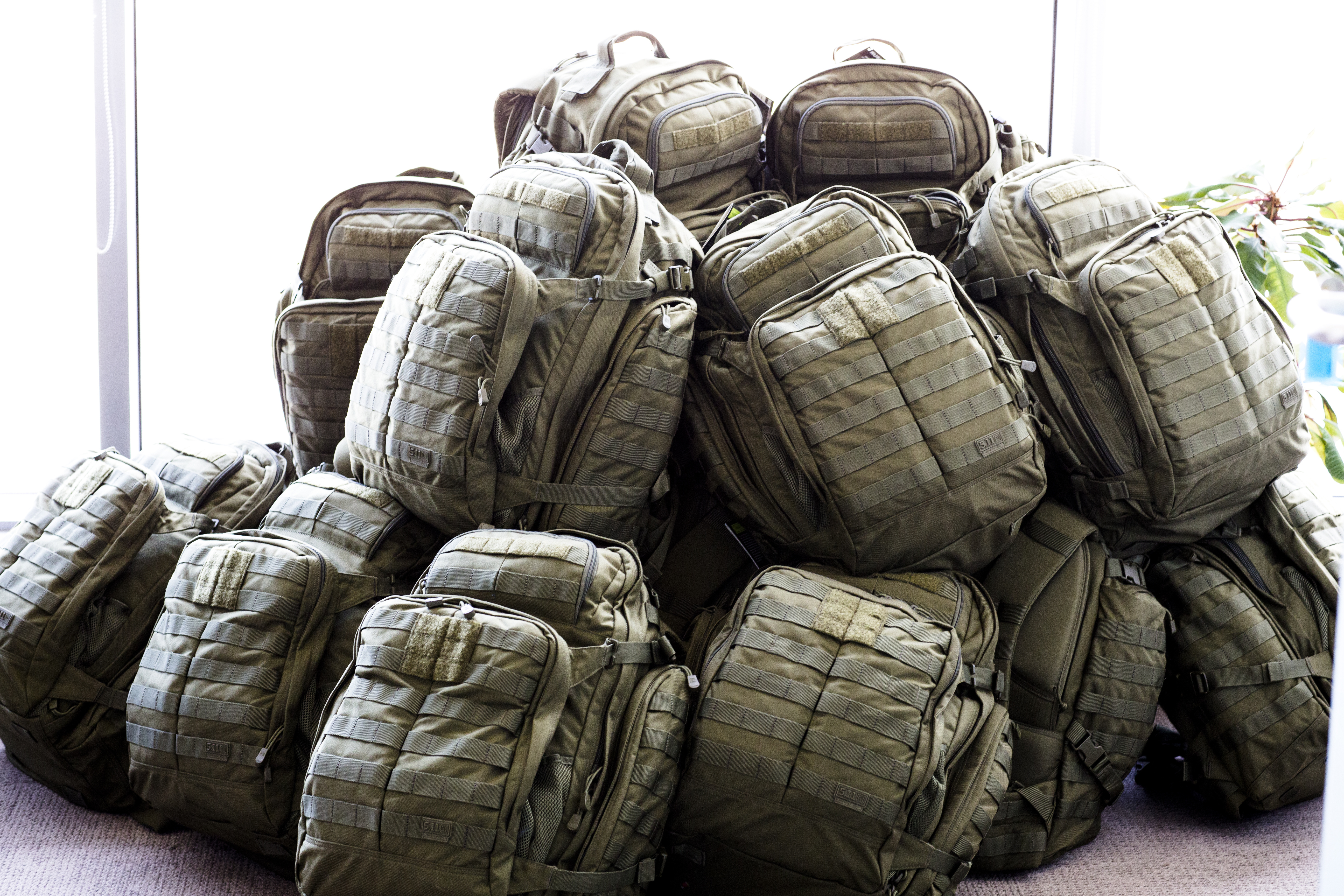
The doctors who took the training and are going into the rear will be doing tactical medicine trainings teaching their colleagues the modern principles of providing medical aid before the patient gets to MFH or a static medical facility. The plan is to train more than 500 medics in the first month.
The five-day course program was maximally adapted to the specific character of trauma and wounds that Ukrainian doctors see in the ATO, with the active participation of local consultants and frequent work of foreign experts on the frontlines.
All classes conducted within the frame of TCCC course and ATLS were divided into five modules.
NATURAL BIOLOGICAL MATERIAL
For the hands-on practice of medical procedures biological material was used – pigs heads, ribs, feet, parts of respiratory tract.
Modern principles of first aid on the battlefield
First trainings
“White lab coats do not have shoulder marks but a combat medic is a separate combat unit”
“The direction that needs us most these days”
Project partners
According to the assessment of independent experts the system of medical care on the battlefield in the ATO does not meet the key requirements used in NATO army and in Israel.
Mobile and field hospitals do not meet international standards, most of their equipment is outdated and does not meet basic requirements, especially in the situation when the load on one mobile hospital is up to 300 surgical operations a month.
Evacuation of the injured from the battlefield is associated with great risk, evacuation to hospitals is complicated and medical aid is sometimes delayed up to 12 hours instead the necessary 60 minutes.
Providing soldiers with individual aid kits, trained doctors with necessary medicines and medical equipment and the existence of a system of evacuation and transport of the wounded to mobile and static hospitals we can reduce mortality among the military contingent significantly and save health to thousands of defenders of Ukraine.
















